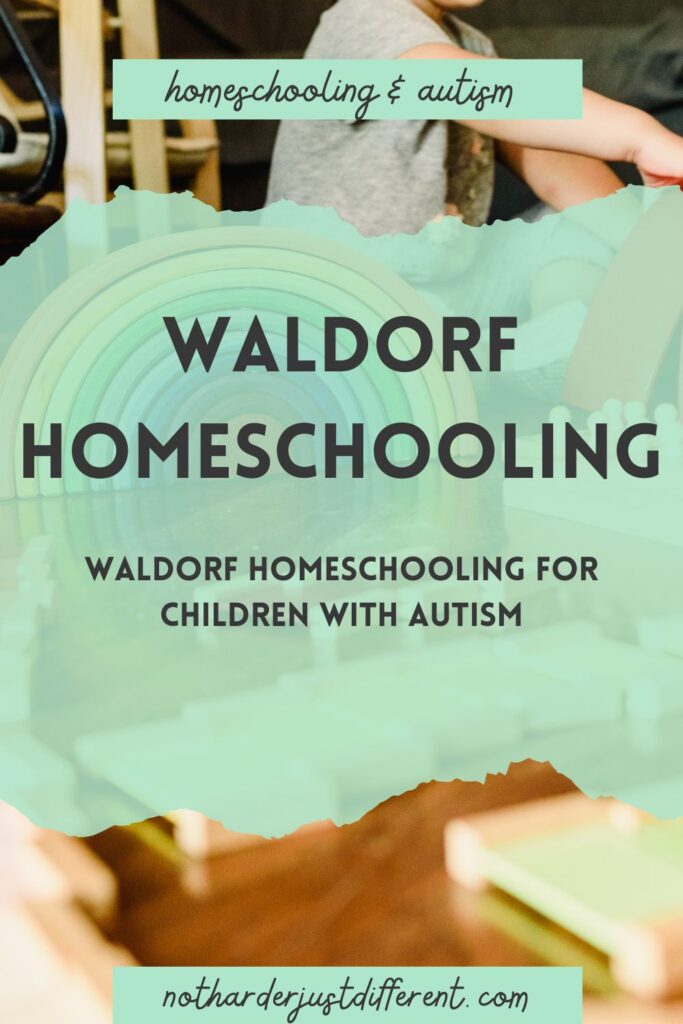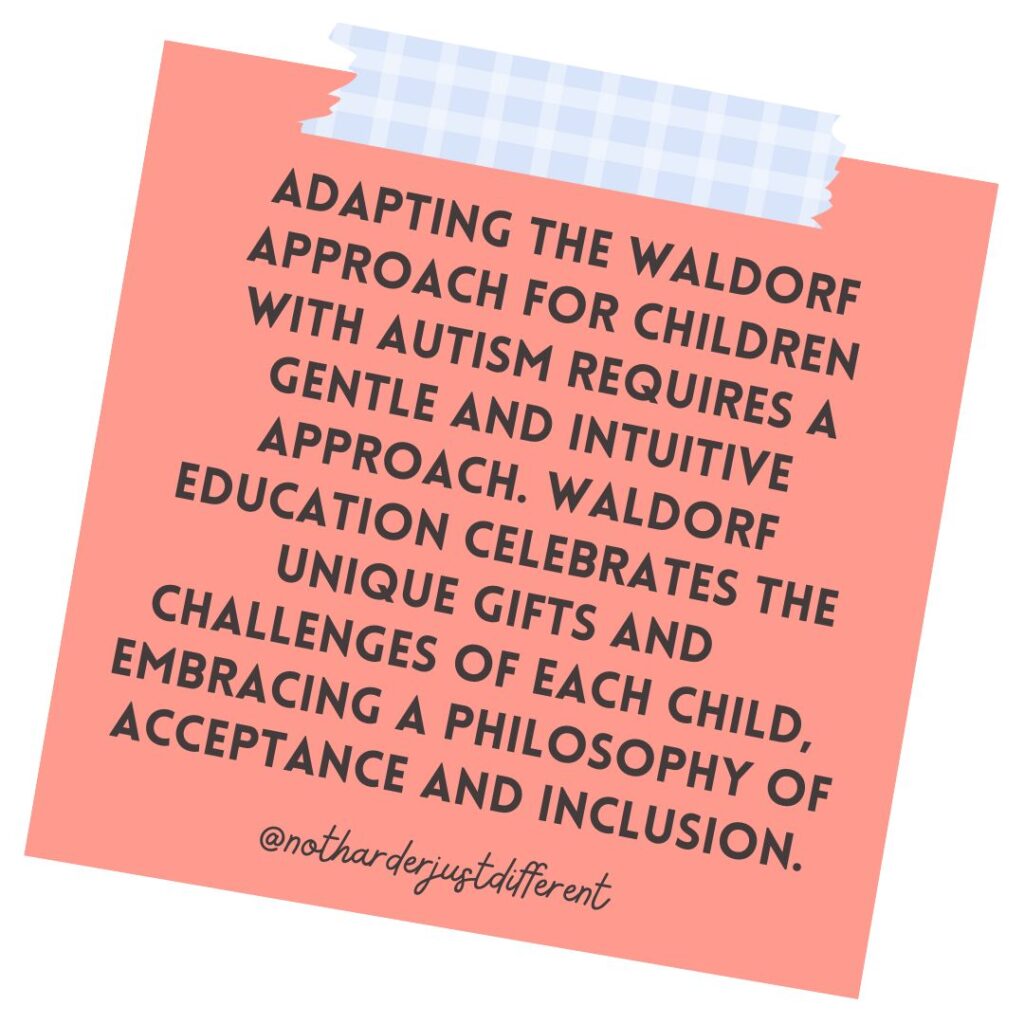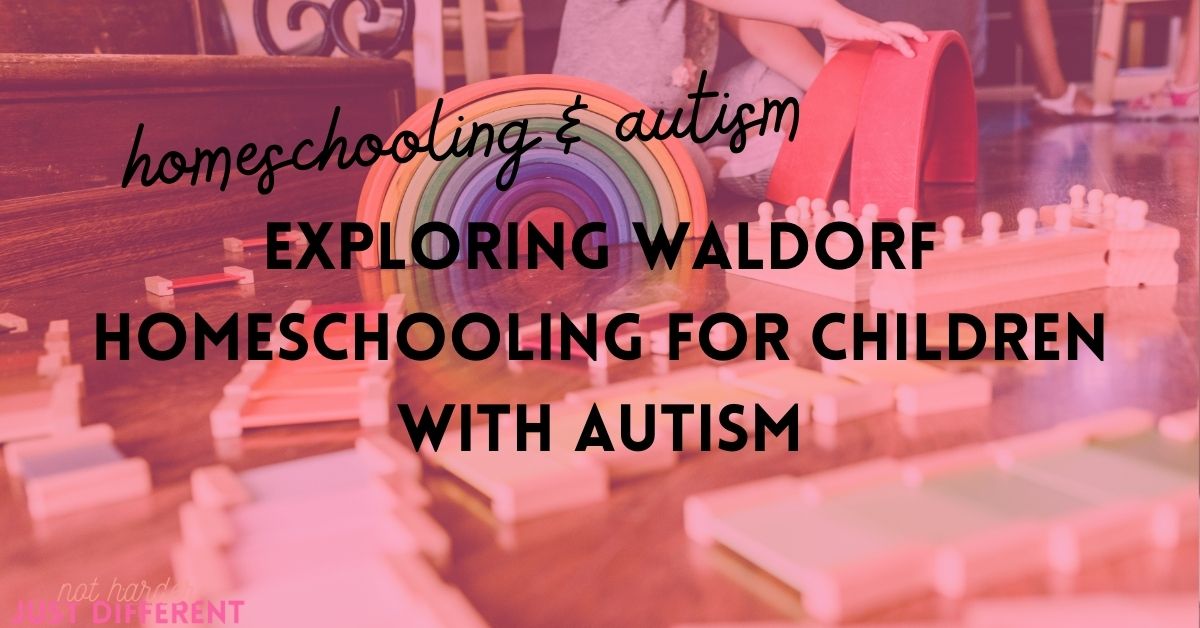Disclaimer: As a future Licensed Clinical Social Worker (LCSW) currently pursuing my master’s degree, I am passionate about sharing insights and information related to parenting, autism and homeschooling based on my personal experiences and research. However, the content shared on this blog is not intended to substitute professional advice, diagnosis, or treatment. Parenting is a deeply personal journey, and while I strive to provide valuable insights, every family and situation is unique. Readers are encouraged to consult with qualified professionals for personalized guidance tailored to their specific needs and circumstances.
Imagine a homeschooling environment where storytelling, art, and nature intertwine to create a magical tapestry of learning. That’s the essence of the Waldorf method—a holistic approach that nurtures the mind, body, and spirit of each child.
We add a lot of Waldorf-inspired activities and methods into our homeschool, especially because I have a very creative kid. Bug is all about creative writing (typed, of course!), drawing, art and exploring different creative outlets. This is where the Waldorf method shines! If you’re looking for a creative, imaginative, and nature-driven method, Waldorf may be for you.

Waldorf Homeschooling for Children with Autism
Understanding Waldorf Homeschooling
Waldorf education, inspired by the teachings of Rudolf Steiner, emphasizes a holistic approach to learning that honors the individuality of each child. Central to the Waldorf method is the belief that education should nourish the whole child—intellectually, emotionally, and spiritually.
In a Waldorf homeschool, learning unfolds through rhythmic, hands-on activities that engage the senses and ignite the imagination. Children are encouraged to explore the world around them through storytelling, artistic expression, and meaningful experiences in nature. The Waldorf curriculum is designed to cultivate a deep connection to the natural world and foster a love for learning that endures a lifetime.
Why Waldorf Homeschooling Works Well for Children with Autism
Waldorf homeschooling offers several aspects that are particularly advantageous for children with autism:
- Sensory-Friendly Environment: Waldorf education emphasizes creating a calm and nurturing environment that appeals to the senses. For children with autism, who may have sensory sensitivities, the warm colors, natural materials, and rhythmic routines of Waldorf homeschooling can provide a soothing and supportive learning environment that promotes relaxation and focus.
- Holistic Approach to Learning: Waldorf education takes a holistic approach to education, addressing the intellectual, emotional, and physical aspects of development. For children with autism, who may have diverse needs and abilities, the holistic nature of Waldorf homeschooling ensures that their educational experiences encompass a wide range of activities and opportunities for growth.
- Artistic Expression and Creativity: Waldorf education places a strong emphasis on artistic expression and creativity, incorporating activities such as painting, drawing, storytelling, and music into the curriculum. For children with autism, who may have a natural inclination towards creative expression and a unique way of perceiving the world, the artistic components of Waldorf homeschooling provide opportunities for self-expression, communication, and emotional regulation.
- Emphasis on Nature and Outdoor Play: Waldorf education values the importance of connecting with nature and spending time outdoors. Children with autism often benefit from outdoor experiences, which can have a calming and grounding effect on their sensory systems. The nature-based curriculum and outdoor activities in Waldorf homeschooling provide opportunities for exploration, sensory integration, and connection with the natural world.
- Focus on Rhythm and Routine: Waldorf education emphasizes the importance of rhythm and routine in daily life, providing children with a sense of predictability and security. Children with autism thrive in structured environments with clear expectations and routines, and the rhythmic nature of Waldorf homeschooling helps create a sense of stability and consistency that supports their learning and development.
- Inclusive and Socially Supportive Environment: Waldorf education fosters a sense of community and social connection, emphasizing cooperation, empathy, and mutual respect. For children with autism, who may face challenges in social communication and interaction, the supportive and inclusive environment of Waldorf homeschooling provides opportunities for meaningful social engagement, friendship building, and peer support.

Tailoring Waldorf for Autism
Adapting the Waldorf approach for children with autism requires a gentle and intuitive approach. Waldorf education celebrates the unique gifts and challenges of each child, embracing a philosophy of acceptance and inclusion.
Create a nurturing environment that supports your child’s sensory needs and promotes a sense of security and belonging. Incorporate sensory-rich materials like natural fibers, wooden toys, and tactile elements that engage the senses and stimulate the imagination.
Practical Tips and Strategies
Let’s dive into the practical side of Waldorf homeschooling! Start by creating a cozy, inviting learning space that reflects the beauty and simplicity of the Waldorf philosophy. Use soft lighting, warm colors, and natural materials to create a calming atmosphere that inspires creativity and imagination.
Integrate storytelling into your daily rhythm, using vivid language and imaginative tales to capture your child’s imagination and spark curiosity. Engage in artistic activities like drawing, painting, and modeling with clay, allowing your child to express themselves freely and explore their creativity.
Embrace the rhythm of the seasons and incorporate nature walks, gardening, and outdoor exploration into your homeschooling routine. Encourage your child to observe the changes in the natural world and develop a deeper connection to the earth and its cycles.
Embracing the Waldorf Philosophy
At the heart of the Waldorf philosophy lies a profound reverence for childhood and a belief in the inherent goodness and potential of each child. Waldorf homeschooling invites us to embrace the wonder and magic of childhood, fostering an environment where learning is joyful, meaningful, and infused with wonder.
In Waldorf education, the arts play a central role in nourishing the soul and stimulating the imagination. Through music, movement, and drama, children explore their inner world and develop a sense of self-expression and creativity. Whether it’s singing songs, reciting poetry, or engaging in dramatic play, the arts provide a gateway to the child’s innermost thoughts and feelings.
Waldorf homeschooling encourages a reverence for the natural world and a deep respect for the interconnectedness of all living things. Through hands-on experiences in the garden, forest, and farm, children develop a sense of stewardship and responsibility for the earth. They learn to observe the rhythms of nature, cultivate empathy for all living beings, and develop a profound sense of gratitude for the gifts of the earth. By embracing the Waldorf philosophy, we not only nurture the intellectual growth of our children but also cultivate their moral and spiritual development, instilling in them a deep sense of reverence, wonder, and awe for the world around them.
Celebrate your child’s unique gifts and strengths, and honor their individual journey of growth and discovery. Through the gentle rhythms of Waldorf homeschooling, we have the opportunity to nurture the whole child—body, mind, and spirit—and cultivate a deep love for learning that will accompany them throughout their lives. Let’s embark on this enchanting journey together and unlock the extraordinary potential within our children with autism through the magic of Waldorf homeschooling!

